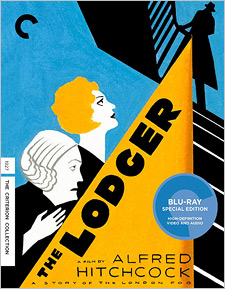Lodger, The: A Story of the London Fog (Blu-ray Review)

Director
Alfred HitchcockRelease Date(s)
1927 (June 27, 2017)Studio(s)
W & F Film Service/Artlee Pictures/Gainsborough Pictures/ITV Studios (Criterion - Spine #885)- Film/Program Grade: See Below
- Video Grade: See Below
- Audio Grade: See Below
- Extras Grade: A-
- Overall Grade: A
Review
Alfred Hitchcock’s silent classic The Lodger: A Story of the London Fog has long been considered the first true “Hitchcock” film, mostly by the director himself. Based upon the novel by Marie Belloc Lowndes, the film tells of a serial killer known as The Avenger who may or may not be the newly-arrived resident at the home of a young woman and her gentlemen policeman caller. Released in 1927 in Britain and a little over a year later in the U.S., the film was a hit and paved the way for Hitchcock to explore themes that would eventually set the bar for psychological thrillers.
Downhill (originally titled When Boys Leave Home in the U.S.) was also released in 1927. Based upon the play of the same name and co-written by its star Ivor Novello and actress Constance Collier, a story unfolds about a young man named Roddy and his close friend Tim who are falsely accused of impregnating a local woman by the headmaster at their boarding school. Accepting the indictment to help his friend, Roddy is expelled from school and driven away from home to live a lesser life than the one he was bred for. A considerably non-Hitchcock type story, the film still shows early signs of the director’s style and his then unorthodox use of German expressionism.
Criterion presents The Lodger via a 2K restoration of a 35mm duplicate negative that was carried out in 2012. It’s a remarkably fresh presentation with thorough grain levels and excellent depth and detail. Black levels are fairly solid and deep while overall contrast is satisfying. Tinting features occasionally strong hues while leftover film damage is minimal, being reserved only for the irreparable. Downhill is sourced from another 2K restoration from 2012, but from three 35mm nitrate prints. Aside from mild density issues and occasional speckling, the quality of the presentation is much of the same with strong grain fields, solid blacks, and excellent contrast. Although the tinted portions have been artificially recreated, they appear to fit in with the overall look of the film without obvious modern intrusion. The audio for both films features new symphonic scores by Neil Brand via 2.0 linear PCM tracks. Both are crisp presentations leaving little room for complaint. No subtitle options are provided, for obvious reasons.
THE LODGER (FILM/VIDEO/AUDIO): A-/A-/A+
DOWNHILL (FILM/VIDEO/AUDIO): B+/A-/A+
As for the supplemental materials, they include the additional and previously discussed film Downhill; an interview with William Rothman; The Bunting House: Space and Structure in The Lodger, a video essay by art historian Steven Jacobs; an interview with composer Neil Brand; audio excerpts from a 1962 discussion between Alfred Hitchcock and François Truffaut; two audio excerpts from 1963 and 1972 between Hitchcock and Peter Bogdanovich; a 30-minute radio adaptation of The Lodger, directed by Hitchcock for the July 22, 1940 pilot episode of the CBS radio series Suspense; and a 2-sided paper insert with essays on both The Lodger and Downhill by Phillip Kemp, as well as restoration details. Not included from the Premiere Collection DVD released by MGM is an audio commentary by author Patrick McGilligan; The Sound of Silence: The Making of The Lodger; Hitchcock 101; a still gallery; and a restoration comparison, although the latter item is obsolete compared to the transfer on this release.
Films fans who have only ever seen Hitchcock’s most famous releases, such as Psycho, The Birds, and Vertigo, owe it to themselves to go back and trace the path of the director’s distinguished career. While not quite as compelling as his later work, there an abundance of entertainment value to be found in both The Lodger and Downhill. Criterion’s presentations of each film are nearly perfect given the circumstances, and as always, the more of Hitchcock’s work in high definition, the better.
- Tim Salmons

